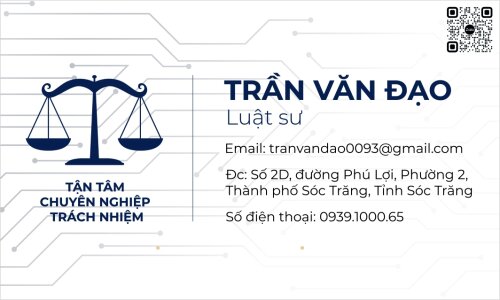Best Conveyancing Lawyers in Can Tho
Share your needs with us, get contacted by law firms.
Free. Takes 2 min.
Free Guide to Hiring a Real Estate Lawyer
List of the best lawyers in Can Tho, Vietnam
About Conveyancing Law in Can Tho, Vietnam
Conveyancing in Can Tho, Vietnam refers to the legal process of transferring property ownership from one party to another. This typically involves the preparation, verification, and lodgment of legal documents required by Vietnamese law to effect the sale or purchase of real estate. Conveyancing ensures that all legal requirements and procedures are correctly followed so property transactions are valid and enforceable. In Can Tho, with its rapidly developing real estate market, the conveyancing process is governed by a combination of national Vietnamese property laws and local regulations implemented by provincial authorities.
Why You May Need a Lawyer
While some property transactions can appear straightforward, conveyancing in Can Tho often presents unique legal challenges. You may need a lawyer in situations including:
- Buying or selling residential, commercial, or industrial property
- Dealing with land use rights, including leases and transfers
- Completing due diligence to ensure legal ownership and verify any liabilities or encumbrances on the property
- Negotiating terms and drafting contracts of sale or purchase
- Resolving disputes related to property boundaries, inheritance, or co-ownership
- Navigating transactions involving foreign individuals or organizations, who face specific restrictions under Vietnamese law
- Ensuring compliance with tax obligations and government permissions
A qualified lawyer guides you through the legal maze, reduces the risks of fraud or mistakes, and helps you protect your investment.
Local Laws Overview
Can Tho’s conveyancing process is mainly regulated by Vietnam’s national laws, including the 2013 Land Law, the 2014 Law on Real Estate Business, and the 2015 Civil Code. Key local regulations may also apply in specific cases. Notable aspects relevant to conveyancing in Can Tho include:
- All property transactions must be registered with the local Land Registration Office
- Land use rights, not land ownership itself, are transferred, since land is collectively owned by the State
- Only individuals or entities that meet specific legal criteria may purchase property, especially for foreigners or foreign-invested enterprises
- Contracts for the transfer of land use rights must be made in writing and notarized by local notary offices
- Payments of transfer taxes and associated fees are required before registration is complete
- Inheritance, gifting, or mortgage of land use rights must also go through local administrative processes and may require additional approvals
Understanding local procedural steps and the legal documentation involved is vital to avoid common pitfalls or delays.
Frequently Asked Questions
What is conveyancing in Can Tho?
Conveyancing is the legal process of transferring land use rights and property ownership in Can Tho. It involves preparing contracts, checking title status, paying taxes, and registering the transaction with local authorities.
Do foreigners have the right to buy property in Can Tho?
Foreigners can acquire certain types of property in Vietnam, mainly residential apartments and houses within eligible projects. There are restrictions and conditions, so legal advice is important to ensure compliance.
How long does the conveyancing process usually take?
The timeline can vary, but typically, the process takes between three to six weeks if all documents are in order and there are no disputes or delays at governmental offices.
What documents are required for transferring property?
Key documents include the land use rights certificate, identity documents, a notarized sale agreement, tax receipts, and any approvals or permissions needed by local authorities.
Is it mandatory to use a notary for conveyancing?
Yes, Vietnamese law requires that contracts for sale or transfer of real estate be notarized by an authorized notary office for the transfer to be legally recognized.
What taxes or fees must I pay during conveyancing?
Typical taxes and fees include the registration fee, personal income tax (applies to the seller), notary fee, and administration charges. Some exemptions apply in special cases.
Can I transfer property I received through inheritance?
Yes, inherited land use rights or property can be transferred. The process involves additional steps, such as obtaining inheritance certificates, payment of inheritance tax, and administrative approvals.
What happens if the property has existing disputes or debts?
Properties under dispute or with outstanding debts cannot be legally transferred. Due diligence by a lawyer helps detect such problems before you proceed with the transaction.
How do I check the legal status of property before buying?
A lawyer can help you obtain an updated land use rights certificate, conduct searches for encumbrances, and verify the ownership status with the local Land Registration Office.
What should I do if I am a co-owner or purchasing with others?
Co-ownership arrangements must be clearly set out in the purchase agreement, and all co-owners need to be named in official documentation. Legal guidance is essential to avoid future disputes.
Additional Resources
If you need further guidance on conveyancing in Can Tho, the following resources and organizations may be helpful:
- Can Tho Department of Natural Resources and Environment - oversees land management and land use rights
- Local Land Registration Offices - responsible for recording property transactions
- Can Tho Notary Offices - provide legally mandated notary services for property transfers
- Vietnam Bar Federation and Can Tho Bar Association - directories of qualified legal professionals
- Local banks and financial institutions - information on property-related loans and mortgages
- General Department of Taxation - for guidelines on taxes arising from property transfers
Next Steps
If you are considering buying, selling, or transferring property in Can Tho, effective preparation is crucial. Consider the following steps:
- Contact a lawyer or legal professional experienced in conveyancing to discuss your situation
- Gather all necessary documents, such as land use rights certificates and identification
- Request a legal check of the property’s status and any potential encumbrances or disputes
- Arrange a meeting with a certified notary to discuss the transaction
- Prepare for payment of taxes and registration fees
- Ensure all contracts and agreements are clear, legally compliant, and reflect your intentions
Seeking legal advice at the earliest possible stage can help you avoid risks, ensure a smooth transaction, and protect your interests throughout the conveyancing process in Can Tho, Vietnam.
Lawzana helps you find the best lawyers and law firms in Can Tho through a curated and pre-screened list of qualified legal professionals. Our platform offers rankings and detailed profiles of attorneys and law firms, allowing you to compare based on practice areas, including Conveyancing, experience, and client feedback.
Each profile includes a description of the firm's areas of practice, client reviews, team members and partners, year of establishment, spoken languages, office locations, contact information, social media presence, and any published articles or resources. Most firms on our platform speak English and are experienced in both local and international legal matters.
Get a quote from top-rated law firms in Can Tho, Vietnam — quickly, securely, and without unnecessary hassle.
Disclaimer:
The information provided on this page is for general informational purposes only and does not constitute legal advice. While we strive to ensure the accuracy and relevance of the content, legal information may change over time, and interpretations of the law can vary. You should always consult with a qualified legal professional for advice specific to your situation.
We disclaim all liability for actions taken or not taken based on the content of this page. If you believe any information is incorrect or outdated, please contact us, and we will review and update it where appropriate.











